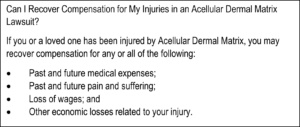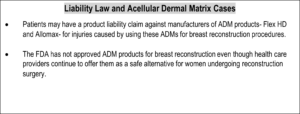Some women undergo reconstructive breast surgery following breast cancer to restore their shape and appearance. Others may elect to have breast surgery for aesthetic purposes. In implant-based breast reconstruction surgery, surgeons may use only breast implants. But some surgeons opt to use both breast implants and acellular dermal matrix (ADM). However, ADM products used in breast implant reconstruction surgery may cause medical complications.
Our law firm is currently handling lawsuits on behalf of individuals who have received certain acellular dermal matrix (ADM) products during breast implant reconstruction surgery. Lawsuits against manufacturers of affected ADM products claim that they present a greater risk of medical complications than other ADM products or surgery without ADM products.
ADM is a form of surgical mesh made from human skin or animal skin. Manufacturers remove the original donor skin cells but leave the support structure intact. Surgeons use ADM to reinforce weakened tissue in hernia surgeries, burn injuries, eardrum repair, and other types of surgeries. Since 2001, surgeons have used ADM in breast implant reconstruction surgery. But the FDA has not approved ADM for use in reconstructive surgery of the breast.
Injuries associated with ADM products include:
The Food and Drug Administration (FDA) has recommended that surgeons report these adverse events and also consider the risks of off-label uses of ADM.

ADM has been cleared for use in certain reconstructive procedures. But, the FDA has not approved ADM for breast reconstruction surgeries. Nevertheless, surgeons have frequently employed ADMs in the last few years for off-label purposes.
The FDA analyzed data from a study that evaluated outcomes of implant-based breast reconstructive surgery in 11 different facilities. The agency compared those who received ADMs and those who did not receive ADMs to determine the potential dangers of the mesh. The FDA singled out two types of ADMs that posed an increased risk of complications, Flex HD and Allomax. Patients who received these ADMs experienced higher rates of reoperation and infection. The FDA noted similar results from other peer-reviewed publications.
The FDA’s safety communication advised that Flex HD and Allomax carry an increased possibility of surgery, implant removal, and infection than other ADMs or surgery without ADM products.
Lawsuits against manufacturers of Flex HD and Allomax allege that these ADMs resulted in significant harm to recipients. Although the FDA has not approved ADM products for breast reconstruction, health care providers continue to use these hazardous ADMs in implant-based breast reconstructive surgery.

The Lake Law Firm was founded by Edward J. Lake, Esq., a personal injury lawyer for over 25 years. Our dedicated team of attorneys is committed to seeking justice on behalf of those who have suffered injury or death due to the negligence of others. Our experienced attorneys handle many different types of pharmaceutical drugs, medical devices, and other defective products. The lawyers in our firm have helped collect millions of dollars for their clients. The Lake Law Firm will advocate for you and your rights. Please contact us for a free confidential case evaluation.